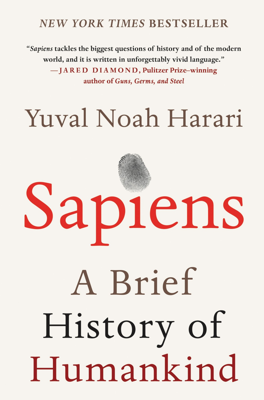Summary
"Sapiens" charts the evolution of Homo sapiens from their origins in the Stone Age through to the modern day. The book is segmented into defining revolutions that shaped human history. It begins with the Cognitive Revolution around 70,000 years ago, which marked the development of complex language and imaginative capacity, allowing sapiens to surpass other species in survival and societal development.
Harari then explores the Agricultural Revolution, beginning about 10,000 years ago. This shift from foraging to farming led to settled societies and sparked a boom in population and technological innovation, but also introduced new challenges such as disease, famine, and social hierarchies. It fundamentally changed human relationships with the environment, other species, and each other, often locking humans into more labor-intensive lifestyles.
The narrative proceeds to the Scientific Revolution, which started around 500 years ago, promoting ideologies that led to world exploration, technological advances, and the reconsideration of traditional knowledge systems. This revolution significantly influenced the Industrial Revolution, enhancing human ability to harness energy and resources, dramatically transforming economies, social orders, and environmental impacts.
In modern terms, Harari discusses capitalism, imperialism, and the global socio-economic networks they forge, critically analyzing their roles in shaping contemporary human societies and their possible future impacts. The book also delves into the theoretical future of sapiens, considering how genetic engineering, artificial intelligence, and other advancements might redefine our species.
The overarching theme of "Sapiens" is how Homo sapiens have dominated the Earth through unique cognitive abilities and social cooperation, facilitated by a shared belief in intangible concepts (money, corporations, nations). Harari provocatively questions the true impacts of these developments on overall human happiness and challenges existing narratives about societal progress and individual well-being.
Per-chapter summary
- An Animal of No Significance
- The Tree of Knowledge
- A Day in the Life of Adam and Eve
- The Flood
- History’s Biggest Fraud
- Building Pyramids
- Memory Overload
- There Is No Justice in History
- The Arrow of History
- The Scent of Money
- Imperial Visions
- The Law of Religion
- The Secret of Success
- The Discovery of Ignorance
- The Marriage of Science and Empire
- The Capitalist Creed
- The Wheels of Industry
- A Permanent Revolution
- And They Lived Happily Ever After
- The End of Homo Sapiens
